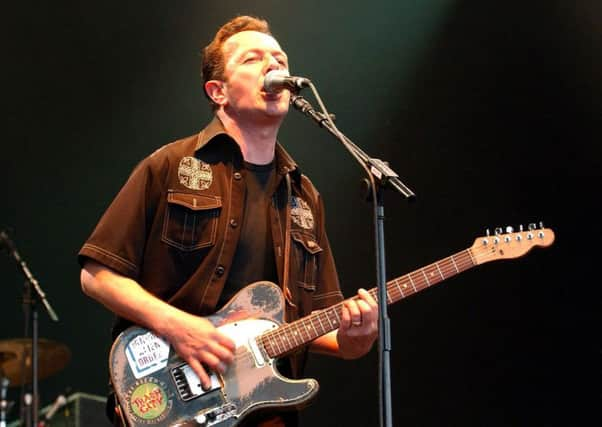Euan McColm: Rock 'n' roll's rejection of middle class doesn't stand up to scrutiny


People lose their minds over the littlest things, these days, don’t they?
Take the case of Jeremy Corbyn and his mid afternoon slot at the Glastonbury festival at the weekend. According to his supporters, the adulation afforded Mr Corbyn’s bromides is all the proof we need that he’s the “real” Prime Minister.
Advertisement
Hide AdAdvertisement
Hide AdThe Labour leader’s opponents were quick to point out that he was hardly reaching out to the dispossessed by addressing tens of thousands of people who’d paid almost 250 quid a skull to be there (This take assumes, of course, that someone on a low income couldn’t save up for a ticket).
Mr Corbyn’s appearance at Glasto was what it was: the leader of the second largest political party in the UK addressing a largely sympathetic crowd at a festival which has benefitted organisations such as CND and Greenpeace. Had the Labour leader not been greeted as a hero, then there might have been a story.
And, anyway, Katy Perry was on for much longer and nobody’s arguing she’s the real Home Secretary.
At the heart of the digs at Mr Corbyn was the matter of class, which has haunted popular music since the earliest days of its creation.
We care nothing about the backgrounds of classical musicians - unless, I suppose, there’s an unusual rags to riches or child prodigy yarn to be told - but when it comes to pop music, to rock ’n’ roll, authenticity is everything. And authenticity means anything but middle class.
This weird delusion began to go viral, I suppose, in the mid 1970s when the punk rock movement - a predominantly middle-class thing - decreed that only the authentic sound of abandoned youth (or some such) was worth listening to.
It was not enough to be an entertainer, one had to, depressingly, be one of the people. Rock ’n’ Roll, which had exploded in a burst of glamour and colour less than two decades before, had been infected with a tiresome machismo that decreed what was and wasn’t authentic.
Advertisement
Hide AdAdvertisement
Hide AdYes, the music business has always played on the notion of bands as outsiders - The Rolling Stones, for example, were renegades rather than suburban middle class boys whose success didn’t exactly save them from going down the pit. But with punk, came the stripping away of artifice. Fans wanted to see that bands were just like them. How drab. (If a musician didn’t necessarily have the correct background but was considered cool enough - former public schoolboy Joe Strummer of The Clash, for example - this could be airbrushed away).
Ironically, working class musicians in the 1980s were more likely to be able to get into careers in music because of the benefits system. A genuine wave of working class bands - from Simple Minds in Glasgow to Echo and the Bunnymen in Liverpool and The Smiths in Manchester - started out when they could depend on the dole to support themselves through the early years.
It’s little wonder that, these days, so many bands that make it big seem to come from affluent backgrounds. Who else could afford to take the risk of having a go?
Rock ’n’ Roll’s hate/hate affair with the middle class from which so many of its most successful figures came is tiresome and based on notions of society that don’t stand up to scrutiny.
The middle class is no longer the “them” in a romantic “them and us” story of rock ’n’ roll rebellion. The middle class is now - by dint of its expansion since the end of the second world war - most of “us”.
Those critics of Corbyn who sneer at the music fans at Glastonbury are mistaken if they think those people represent an elite; by contemporary standards, most of them are very ordinary indeed.
Just as there are ageing music fans - mostly male and in their mid-50s - who like nothing more than reliving the days when listening to The Jam seemed a rebellious act, there are those in politics who see the debate in terms of class divisions that no longer exist to the degree they once did.
Advertisement
Hide AdAdvertisement
Hide AdCritics of Jeremy Corbyn - and I included myself - may have made the mistake of failing to recognise great shifts in what it means to be middle class, today.
Young voters brought up in what we might think of as middle class backgrounds are unlikely to have the same expectations about earnings and home ownership as those a generation before did.
Perhaps the “enlighted self interest” of Blairism only worked when there was a realistic opportunity of some personal gain. If there was a cheap mortgage to be had and the prospect of some quick cash on the property market then one might vote to protect all of that.
A new generation of middle class voters won’t be driven to preserve a way of life that doesn’t exist for them. The Labour leader’s detractors - and I still count myself among their number - will have to come to terms with the reality that, although the Labour leader’s politics may have been forged in the 1970s, he is able to connect with voters we might have expected to reject him.
Jeremy Corbyn is not just the voice of a dispossessed underclass but of huge swathes of young middle class voters who will, in time, dictate the results of elections.